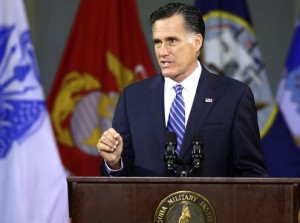On Columbus Day, Mitt Romney went to the Virginia Military Institute to outline a starkly different foreign policy vision from President Obama’s approach of apologizing for America, ignoring Islamism, mistreating our allies and embracing our enemies.
It came none too soon. The Syrian war has spilled across the border of a NATO ally and there are new indications the rebellion is drifting toward the influence of radical jihadists.
In our own hemisphere, the anti-US strongman with whom Obama shared a brother handshake in public, Hugo Chavez, just claimed a new mandate to advance his anti-American cause.
The Iranian regime—the chief opponent of a modern, civilized order in the Middle East — is lurching toward a nuclear weapons capability.
And then there is Libya, where a terrorist attack that killed US ambassador Christopher Stevens and three other Americans has led not to reprisals and serious action, but an administration lying to the American people about national security to a degree not seen since the Vietnam era.
Mitt Romney laid out an alternative that would be stingy with lives of American servicemen, but willing to use American statecraft and power when our interests are clearly on the line.
Where Obama has done nothing to help Syrian rebels for want of a permission slip from the UN, Romney would “identify and organize those members of the opposition who share our values and ensure they obtain the arms they need to defeat Assad’s tanks, helicopters and fighter jets.”
Where Obama and his aides have lied to the American people about the terrorist attack in Libya, Romney vowed to “pursue the terrorists who attacked our consulate in Benghazi and killed Americans,” noting that the attack was work of “terrorists who use violence to impose their dark ideology on others.”
Where Obama turned his back on pro-freedom protestors and sought to sweet talk the deadly Iranian regime out of its nuclear aspirations, Romney promised to position the military force necessary—and to stop the looming defense cuts that would eviscerate that military—in order to convince Tehran that there will be consequences to aggression.
Outlining his approach to the world at large, Romney noted “I believe that if America does not lead, others will–others who do not share our interests and our values–and the world will grow darker.” This commitment to smart internationalism differentiates Romney from an Obama administration that has been asleep at the wheel as revolutions have swept the Middle East, stunned that the president’s repeated apologies for past American conduct and deep bow to the Saudi king somehow did not fix America’s problems in the region.
But Romney also made clear he is no neo-conservative. His plan for Syria rejects the no-fly zone approach to everything advocated by Republicans John McCain and Lindsay Graham. So instead of an open-ended military commitment Americans want least right now, the Romney plan for Syria would influence the future political outcome away from radical Islamists—what really matters most for the future government that will inherit Syria’s chemical weapons arsenal. Overall, the would-be Romney doctrine has a focus on political outcomes abroad—what comes after a war or revolution—that has been missing from recent administrations of both parties.
The one matter conspicuously absent from Romney’s speech was a comprehensive approach to China, which he mentioned only once. China’s unelected government sits atop a kleptocracy that systematically steals American intellectual property and trade secrets, wages a relentless cyber war on the United States, and is undertaking a massive military buildup aimed at pushing the US out of the Western Pacific.
But at least Romney has called for what could be the most important tool in containing an increasingly aggressive China—a strong military centered around a restored US Navy. Beijing will take note of that more than hopeful statements about cooperation from Obama’s diplomats.
President John Quincy Adams famously said that America “does not go abroad in search of monsters to destroy.” So too can we now assume a Romney presidency would avoid foreign adventures. But when others make war on us, we will no longer be afraid to see what we see and respond accordingly.
– – – – – – – – – – – –
Christian Whiton was a State Department senior adviser and this article was originally published at FoxNews.com.

